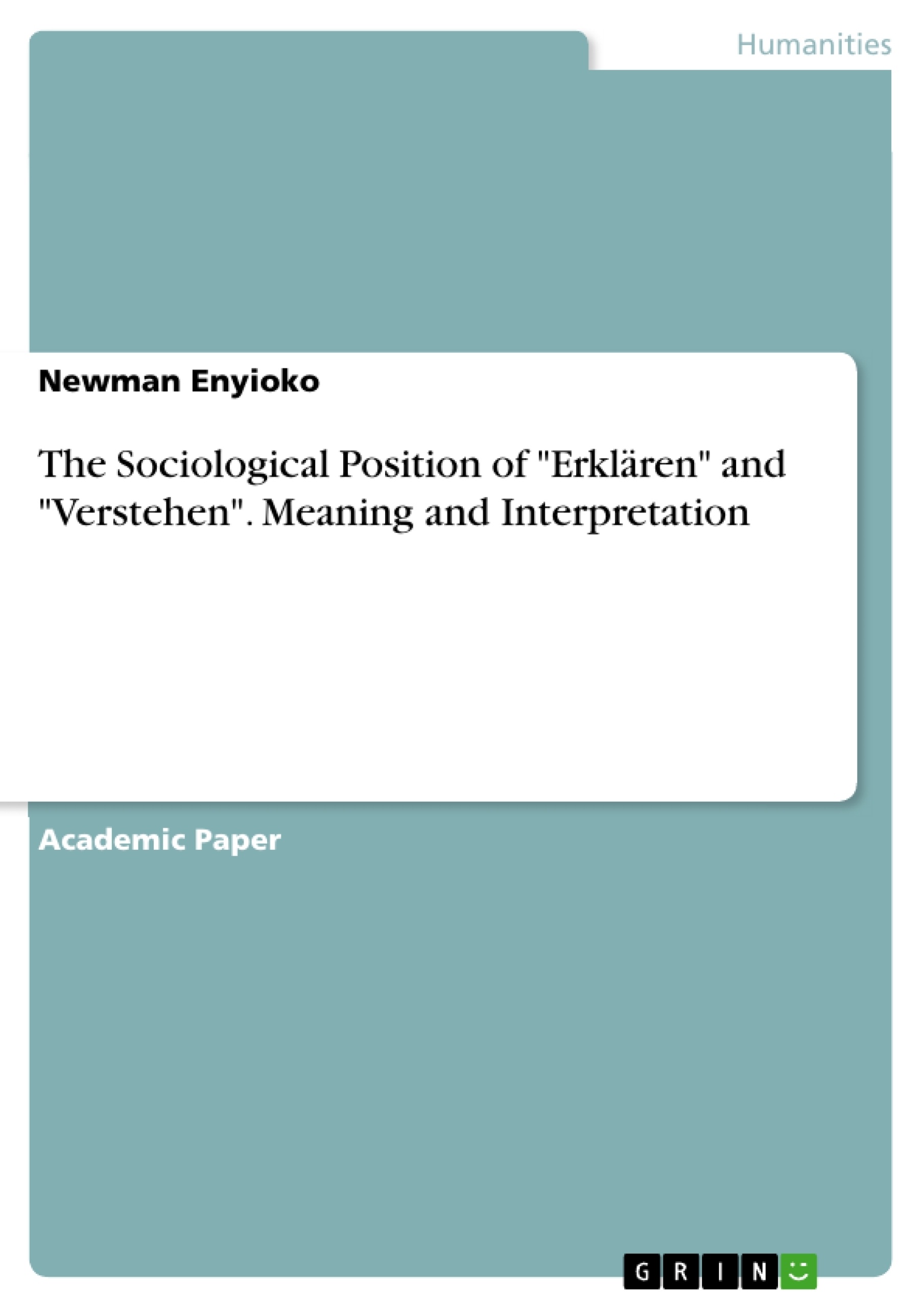The sociological position of "Erklären" and "Verstehen" is viewed in two perspectives according to the meaning and interpretation of each concept. The philosophy of "Verstehen" is interpretative understanding and "Erklären" is concerned with the law-governed explanation, and these are two ways to make scientifically respectable sense of a phenomenon in social research. The scientist, who engages in "Erklären", tries to make explanatory sense of the phenomenon by finding the laws that govern it, whereas the scientist, who engages in "Verstehen", tries to make empathetic sense of the phenomenon by looking for the perspective from which the phenomenon appears to be meaningful and appropriate (interpretism).
The originally German tradition of "Verstehen" insists that the social sciences are unlike the natural sciences, in that making merely explanatory sense of social phenomena can never lead to comprehensive knowledge of these phenomena, even if explanation would be enough, and indeed being all there is to comprehensive knowledge of natural phenomena. The reasons for this claim have been critically analysed in this paper.
The first set of reasons as discussed in this paper, derives from an investigation of the differences between natural and social phenomena based on sociological point of view. The second set discussed derives from a survey of a number of controversies that are high on the agenda of those who assume that "Erklären" and "Verstehen" are incompatible methods, only one of which can be the proper method of the social sciences.
Table of Contents
- Introduction
- Concept of Verstehen (Interpretative Understanding)
- Concept of Erklären (Law-Governed Explanation)
- Purposiveness
- Essential relationality (holism)
- Verstehen and Erklären as Two ways to do social science Research
- Unity of science
- Intentional Explanations
- Subjective Meanings
- Discussion
Objectives and Key Themes
This article explores the sociological positions of Erklären and Verstehen, focusing on the difference between law-governed explanation and interpretative understanding. It delves into the philosophical roots of Verstehen, particularly as articulated by Dilthey, and examines the unique characteristics of social phenomena compared to natural phenomena. The article further analyzes the debates surrounding the compatibility of these methods within the social sciences.
- The philosophical foundations of Verstehen and Erklären.
- The differences between natural and social phenomena.
- The debate surrounding the compatibility of Erklären and Verstehen in social science research.
- The role of meaning and interpretation in understanding social phenomena.
- The application of Verstehen and Erklären in social research.
Chapter Summaries
The introduction provides an overview of the concept of Verstehen and its roots in Dilthey's work. It highlights the significance of meaning and interpretation in understanding social phenomena, contrasting them with natural phenomena. The chapter on the concept of Verstehen delves deeper into the interpretative understanding approach, emphasizing the importance of considering the diverse perspectives and meanings attributed to social phenomena by individuals involved. The concept of Erklären, as discussed in the subsequent chapter, focuses on the law-governed explanation of social phenomena, drawing parallels with the methods employed in natural sciences. The article then explores the implications of these two approaches for social science research, addressing the debate surrounding their compatibility and highlighting the significance of intentional explanations and subjective meanings in social research.
Keywords
The main keywords and focus topics of this work are: Erklären, Verstehen, Interpretative Understanding, Law-Governed Explanation, Social Science, Sociology, Dilthey, Geisteswissenschaften, Meaning, Interpretation, Social Phenomena, Natural Phenomena, Methods of Research, Compatibility of Methods.
- Quote paper
- Dr. Newman Enyioko (Author), 2015, The Sociological Position of "Erklären" and "Verstehen". Meaning and Interpretation, Munich, GRIN Verlag, https://www.grin.com/document/1034552




